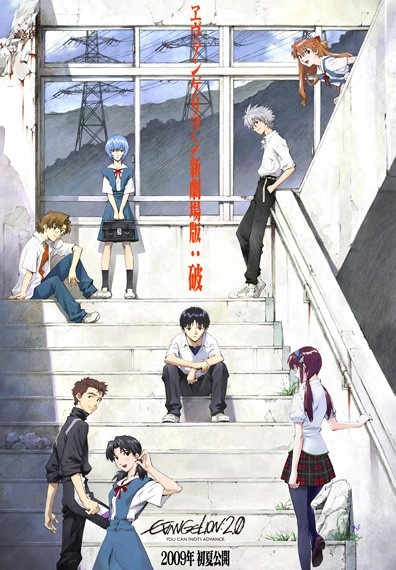-Kozo Fuyutsuki
Genre: Mecha, Action, Psychological
Creators: Hideaki Anno, Kazuya Tsurumaki, Mahiri Maeda
Studio: Khara
Length: 302 minutes total (ongoing)
Years: 2007, 2009, 2012 (ongoing)
Highlights: Second chances
Note: It is recommended that you first read our article on Neon Genesis Evangelion, or this article will make very little sense to you.
A decade later, Anno decided to revisit Evangelion. The difference is that this time, he was respected in the entertainment and artistic communities, happily married, and filthy stinking rich. He decided to tell the story of Evangelion over again, but without the overwhelming depression and stress that he was dealing with during the creation of the original. Plus, it didn’t hurt that animation technology had increased substantially since the original’s release, and that he nabbed an absolutely massive budget to bring his magnum opus to the silver screen. And so begins the salvation of Ikari Shinji, Ayanami Rei, and Asuka Langley Shikinami as Anno gives them a second chance.
Rebuild of Evangelion is a tetralogy of films which retell the story of Neon Genesis Evangelion. The films’ English titles are Evangelion: 1.0 You Are (Not) Alone, Evangelion: 2.0 You Can (Not) Advance, and Evangelion: 3.0 You Can (Not) Redo. They are not simply remakes of the original series with better visuals, but rather an alternative take on the story. The first film follows the first third of the series quite closely, changing only slightly the plot and characterization. The second film follows the series in broad strokes, but changes both the plot and characters substantially. The third film is completely new and barely follows the series at all.
Now, while it is true that Anno’s notorious psychological problems are not coloring the films’ production anywhere near to the same levels as they did when he created NGE, the Rebuild films are by no means less dark than the series. If scenes that elicited horror in the original are still present, they are just as disturbing as in the original. If they were removed than chances are that Anno wrote a new scene that was even more disturbing. Rather like the progression of its parent series, the Rebuild films start out tame and (relatively) ordinary, but each one is progressively darker and more bizarre than the previous; many have argued that 3.0 is even bleaker than the original. However, they are not totally devoid of hope, and there are a number of hints scattered through the movies that the characters in Rebuild might actually be able to earn a happier ending than their earlier counterparts.
Neon Genesis Evangelion, for all of its glory, did have one major problem during its original production, which was a lack of funds. Further, it fell prey to the same fate which haunted numerous series created by Gainax, its original studio: running out of what little money it had before the series was finished. Naturally, due to its enormous success, Anno had no trouble securing a massive budget for the Rebuild films. The extra money and the ten plus years of technological improvement result in the new films being about a hundred steps up from the production values of NGE. This is especially notable in the action scenes, which now fully live up to Anno’s imagination in a way formerly impossible. Everything is these films is bigger, better, faster, and more colorful than it ever could have hoped to be 20 years ago.
Of course, this wouldn’t be Evangelion without the depression, contradictory symbolism, philosophical pondering and plain confusion that the first series has become so infamous for. For example, while Anno claims that Rebuild is his way of giving his characters a (metaphorical) second chance, there are a number of hints that it might be much more of a literal second chance for them. One of the new themes in Rebuild is an exploration of cyclical time and eternal recurrence, with one character in particular seemingly aware of and referencing the events of both NGE and the Rebuild films, despite them seemingly taking place in separate continuities. This idea is reinforced by the Japanese title for the upcoming final film; Evangelion: The New Movie:||. This can be interpreted in one of two ways: either as “||”, which is the musical notation for “end”, or as “ :||”, which is the musical notation for “end, then repeat”.
I highly recommend that you do not watch these films unless you have seen Neon Genesis Evangelion. The films assume you have and as such will spoil major and shocking plot twists of the original. Further, you are expected to be familiar with the original’s plot, as many of the details remain the same and Rebuild will not hand you all of them on a silver platter. This is the nature of remakes, but Rebuild of Evangelion is more than that. It is both an homage to the original with production values that Anno could only dream of originally, and an alternative take on the same characters in order to tell a new story. It is a second chance for Shinji, Rei, and Asuka, and if I took only one thing from my favorite anime series of all time, it’s that these children deserve a second chance.

 RSS Feed
RSS Feed
